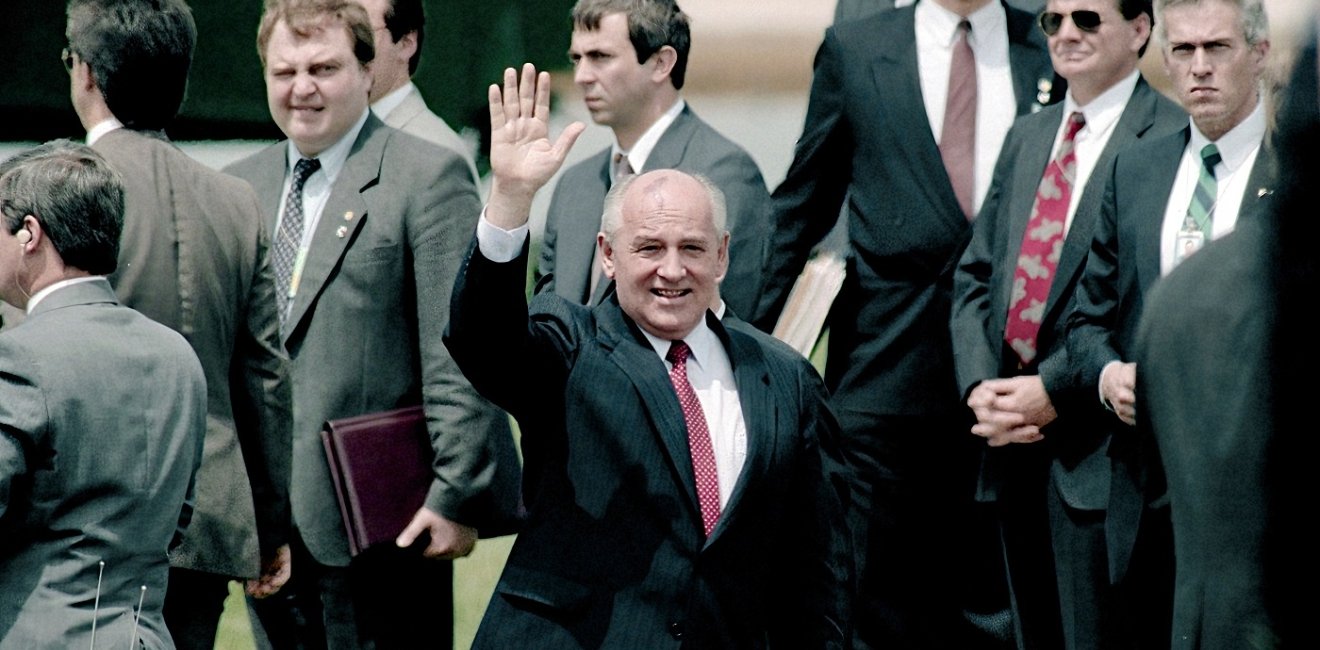
A blog of the Kennan Institute
BY SHARYL CROSS
Thousands of Russian citizens gathered last weekend in Moscow for the funeral of Mikhail Gorbachev, the last leader of the USSR, who dismantled the Soviet totalitarian state and brought an end to the Cold War. Gorbachev’s funeral took place as the Russo-Ukrainian war rages on, Russians are facing restrictions on their freedoms, and, tragically, an “iron curtain” is descending once again between Russia and the West.
When Gorbachev was elevated to General Secretary of the Communist Party in 1985, I was immersed in graduate studies at the RAND/UCLA Center for the Study of Soviet International Behavior established in 1983 to help alleviate the shortage of specialists on Soviet foreign and military policy. We were working with seasoned Sovietologists in our courses at RAND, using methods such as carefully reviewing state-controlled media sources for indicators and assessing the significance of where officials stood at appearances in Red Square.
In 1986, I worked with other UCLA graduate students and faculty to bring together the first of countless conferences that I would organize over the next decades on Soviet/Russian foreign policy. Gorbachev’s statements, style, and initial actions, combined with the fact that he represented a new generation, prompted me to prepare a paper for the session suggesting that this was a different sort of Soviet leader and we might anticipate significant changes. UCLA international relations theory professors were quick to reject this assessment, since they came from a world that considered systemic structural circumstances decisive in global politics, with little room for individuals to make a difference. Soviet area policy experts suggested that I was underestimating the fact that Gorbachev was a product of the communist system.
Subsequently, Gorbachev’s glasnost, perestroika, and new thinking reforms would be consequential for Soviet domestic society and international policy. He withdrew forces from Afghanistan and offered cooperation in allowing for the downfall of the Berlin Wall and German unification. Gorbachev would develop greater trust and excellent working relationships with Ronald Reagan and other American and Western leaders to achieve unprecedented nuclear arms reductions and the end to the Cold War, which had divided East and West for decades.
The dramatic changes of the Gorbachev era would lead many to contend that the Soviet Union was out-spent in the arms race and suffering domestic malaise, making the collapse of the USSR inevitable. But there is no question that the successor emerging from the Brezhnev-Andropov-Chernenko transition could have carried on at the helm of the entrenched totalitarian bureaucratic apparatus without relinquishing power. On Christmas Day 1991, Gorbachev responded to popular calls for the dissolution of the USSR, surrendering enormous power and avoiding what might have been a much more destructive dismantling of an empire.
The reforms of the Gorbachev period made it possible to engage with the academic communities in the Soviet Union and Russia and neighboring nations, fundamentally changing the way we approached foreign policy research and analysis. I was traveling frequently to Moscow during the 1990s to meet for discussions where our colleagues were free to express their views on foreign policy issues and potential areas for United States-Russian strategic cooperation without fear of reprisals. It was a dynamic period of rapid change and hardship for the nations of the former Soviet empire, but it still inspired hope for the future.
In April 1999, I met with Gorbachev when I was a Fulbright professor at the Moscow State Institute of International Relations (MGIMO) and the Institute of USA and Canada Studies/RAS. Gorbachev spoke with me at length about his concerns regarding NATO’s military action in response to the collapse of former Yugoslavia. He expressed disappointment, stating that there was an understanding with his American counterparts that NATO would not expand.
The year of the U.S.-led NATO/Kosovo Air War in 1999 would prove to be a turning point in Russia’s post-Soviet posture toward the West. While the initial official foreign policy statements of the Russian Federation emphasized common values and interests with Western civilization, the National Security Concept, 2000 reflected a sobering reappraisal, citing NATO’s use of force outside its area of responsibility as a threat to global stability. Gorbachev would be widely criticized in his country for failing to secure binding guarantees from the West on NATO expansion, paving the way for Vladimir Putin to garner public support in Russia because he was seen as resisting any compromise of national interests in dealing with Western leaders.
Several years later, while serving on the faculty at the George C. Marshall Center in Germany, I was invited by the Gorbachev Foundation to participate in the “New Policy Forum,” which brought foreign policy communities from around the world together to discuss critical global issues and ways to enhance cooperation and problem-solving. In these discussions it was obvious that Gorbachev remained quite concerned about the shared security challenges facing the world in arms control and nuclear proliferation, environmental decay, militarization, economic disparity and poverty.
Those contending that Gorbachev was naïve could not be more wrong. Gorbachev had the vision to recognize that failure to establish better ways of fostering cooperation among the countries of the increasingly interconnected world in managing challenges posed perilous consequences for the future of humanity.
There is no question that nations of the former Soviet bloc have benefitted from NATO partnership and integration. The NATO-Russia Council offered opportunities for expanding practical forms of security cooperation in the decades following the collapse of the Soviet Union. However, Russia’s dissatisfaction with the post-Cold War European security architecture and the perceived unwillingness on the part of the U.S. to take account of Russia’s interests in developing an alternative arrangement have contributed to the current war in Ukraine, which jeopardizes regional and global security.
Like many citizens of Russia and Ukraine, Gorbachev and his wife Raisa had both Russian and Ukrainian family origins. Pavel Palazchenko, who worked with Gorbachev for decades during his time as president of the Soviet Union and later at the Gorbachev Foundation, said that Gorbachev was “traumatized” by developments in Ukraine. The Gorbachev Foundation issued a statement, with Gorbachev’s approval, shortly after Russia’s February 24 invasion of Ukraine which called for “early cessation of hostilities and immediate start of peace negotiations,” emphasizing that there “is nothing more precious in the world than human lives.”
The unleashing of the first ground war in Europe since WWII is certainly far from Gorbachev’s vision of a “common European home” that would have been a much more desirable outcome for Russia, Ukraine, and all the nations of Europe. The past six months has brought brutal destruction, resulting in thousands of casualties, devastation, and displacement of Ukraine’s communities; no clear mutually acceptable end for the conflict; and the risk of escalation, where catastrophic nuclear actions, accidents, or a direct Russia-NATO confrontation cannot be ruled out.
Mikhail Gorbachev—a single individual and exceptionally courageous statesman—transformed history and impacted the lives of millions, creating an opening for building a more peaceful world order. History should judge Gorbachev as a man who had the insight to appreciate the interconnection of humanity. He was driven by a desire to contribute to advancing democracy, free expression, and de-militarization, rather than being motivated by the short-sighted egotistical power ambition typical of many political figures.
The global arena today is far more dangerous and less stable than the world Gorbachev left to nations of the former Soviet Union and beyond. There has been an outpouring of expressions of condolence and respect for Gorbachev from leaders throughout the world. But sadly, Hungary’s Prime Minister Viktor Orban was the only Western head of state attending Gorbachev’s funeral because of Russia’s deteriorating relationships with the U.S. and European nations. We can only hope that Gorbachev’s commitment to advancing freedom, dialogue, peace, and cooperation within and among societies will serve as inspiration for future generations in Russia and the wider world. Vichnaya Pamyat, Mikhail Sergeyevich, RIP.
The opinions expressed in this article are those of the author and do not reflect the views of the Kennan Institute.
Author

Distinguished Professor and Director of the Kozmetsky Center, St. Edward's University

Kennan Institute
After more than 50 years as a vital part of the Wilson Center legacy, the Kennan Institute has become an independent think tank. You can find the current website for the Kennan Institute at kennaninstitute.org. Please look for future announcements about partnership activities between the Wilson Center and the Kennan Institute at Wilson Center Press Room. The Kennan Institute is the premier US center for advanced research on Eurasia and the oldest and largest regional program at the Woodrow Wilson International Center for Scholars. The Kennan Institute is committed to improving American understanding of Russia, Ukraine, Central Asia, the South Caucasus, and the surrounding region through research and exchange. Read more

Explore More in The Russia File
Browse The Russia File
Chechnya as a Model of Modern Russia

Russia’s Indigenous Communities and the War in Ukraine

Gas and Power in a Changing US–Russia Relationship

